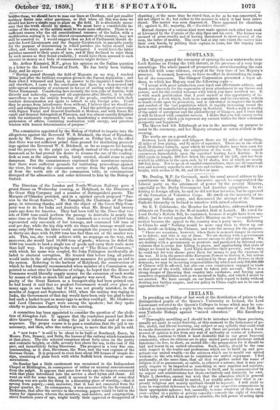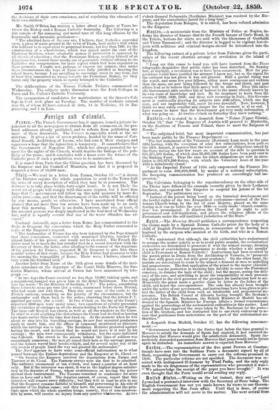IRELAND.
In presiding on Friday of last week at the distribution of prizes to the distinguished pupils of the Queen's University in Ireland, the Lord Lieutenant referred to the Queen's Colleges in terms which may be con- sidered as intentionally a reply to the recent manifesto of the Irish Ro- man :Catholic Bishops against "mixed education." His Excellency said :— " Thoroughly unwilling as I should be to introduce into these precincts, usually set apart to social festivity, at this moment to the futherance of po- lite, useful, and liberal learning, any subject or any syllable that could tend to excite dissension or promote discord, yet there are periods when a frank avowal of opinion is due from any seat of authority or centre of influence. I do, then, continue to think it most desirable that in our great Imperial community, where its citizens are to play united parts and discharge united functions—to live, in short, an united life—the preparation for it should be laid and learnt in an united education. Such, surely, should be the case with respect to the trades and professions which are to build up and per- petuate our united wealth—to the sciences which are to mould our united wisdom—to the arts which are to constitute our united enjoyment. I feel profoundly, at the same time, that all that we gather under the name of religion is of so paramount, so subtle, so ethereal a nature, that it may pro- perly require to be imparted as something at once superior and separate, which may repel all interference foreign to itself, and be communicated by no organs and ministrations but those exclusively and distinctly its own. While I, therefore, cannot but wish that the education which is general and mainly secular should be united, I as readily admit that what is ex- pressly religious and mainly spiritual should be separate. I will yield to none in respectful deference to the clergy of our respective communions in their appropriate spheres ; but, assuredly, to none whatever of them can I ever—either in a public or private capacity—concede the right of denying to the laity, of which I am myself a member, the full power of acting upon the decisions of their own conscience, and of regulating the education of their own children."
Mr. Smith O'Brien has written a letter about a dispute at Tuam be- tween the Bishop and a Roman Catholic fraternity. The following is a fair sample of the reasoning and moral tone of this long effusion by the honourable and incurable gentleman- " The admitted facts of the case are, I believe, that Catholics expended upon a piece of waste ground in the town of Tuam, held under a title which was believed to be equivalent to perpetual tenure, not less than 7001. for the construction of a school-house, which was placed under the care of the Christian Brothers, whose admirable system of instruction is approved by all friends of education ; that the Protestant Bishop, availing himself of an iniquitous law, turned these monks out of possession without offering to the Catholics any compensation for their capital which had been expended on these premises. I ought not, perhaps, to express my opinion, that under these circumstances the boys of Tuam were fully justified in burning the school-house, because I am unwilling to encourage arson in any form, but at least they committed no wrong towards the Protestant Bishop, for they burnt only the property which in equity belonged to the Catholics."
The deliberations of the Roman Catholic Prelates commenced on Wednesday. The subjects under discussion were the Irish Colleges in Paris and Dr. Cullen's Catholic University.
The examination of candidates for matriculation at the Queen's Col- lege in Cork took place on Tuesday. The number of students entered was 50, of whom 23 have entered in Arts, 14 in Medicine, 12 in En- gineering, and 1 in Law.



























 Previous page
Previous page